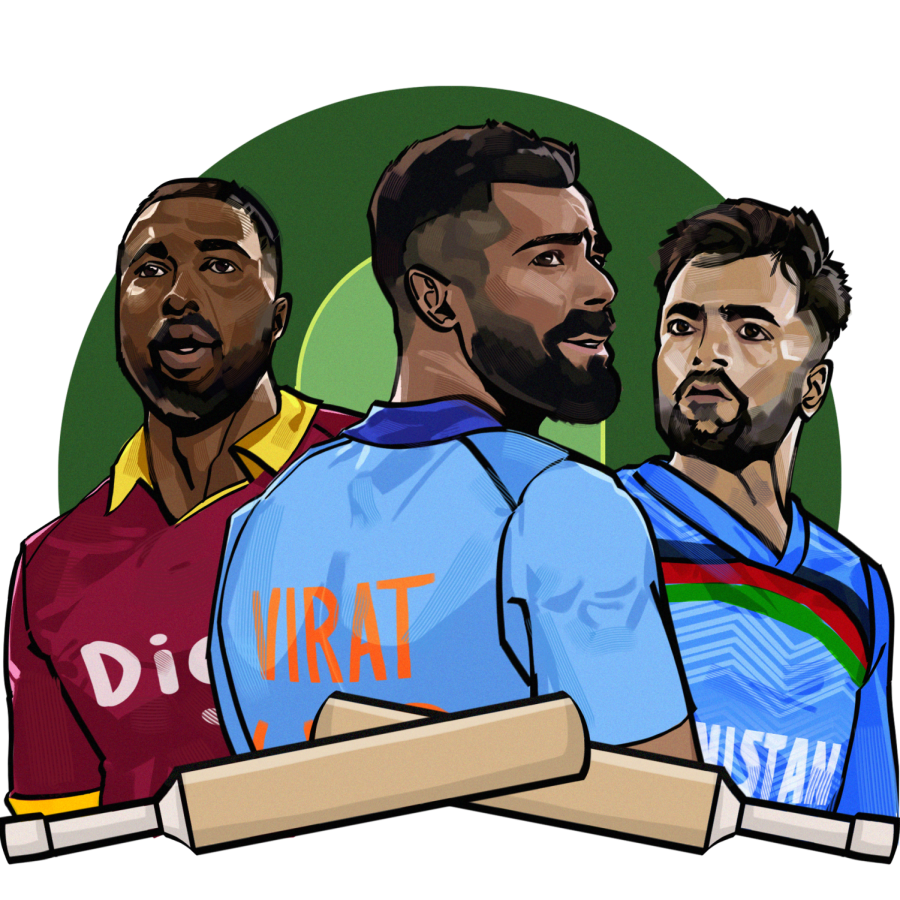International Cricket Council to hold a T20 championship shaped by current events
Illustration by Angelina Hu
From left to right, Kieron Pollard from West Indies, Virat Kohli from India and Rashid Khan from Afghanistan pose together. In their careers, Pollard, Kohli and Khan have cemented their places as top T20 cricket players internationally.
October 18, 2021
As tropical storm Shaheen made landing on the Arabian peninsula earlier this week, residents of Oman scrambled to find shelter and stay safe. Amidst the devastation of the storm, several worried officials found a relieving sight: lush, thick grass nourished by the storm’s three to four inches of rainfall — or, in other terms, a perfect green backdrop for several intense matches of cricket.
Organized by the International Cricket Council (ICC), the Men’s T20 World Cup runs from Oct. 17 to Nov. 14. T20 teams from 16 countries will take part in this tournament: after eight underdog teams play each other in a series of preliminary matches hosted by Oman, the winning four have the chance to compete for the championship in the United Arab Emirates with the current top eight T20 teams. T20 cricket is one of three forms of cricket, as well as the shortest, limiting each team to playing twenty overs of six balls each. The other two formats are One Day cricket, named after the duration of the game, and Test cricket, which can last for up to five days.
Afghanistan, Australia, England, India, New Zealand, Pakistan, South Africa and the West Indies are the current top eight teams, and the underdogs seeking to challenge them will be Bangladesh, Ireland, Namibia, the Netherlands, Oman, Papua New Guinea, Scotland and Sri Lanka. The last cup took place in 2019, when England took the championship title.
For cricket fans, this upcoming World Cup is a welcome step toward a new normal after the period of limited sports activity brought on by the COVID-19 pandemic. Due to safety protocols, the tournament, which was originally slated to take place in 2020 in Australia, was scrapped with hopes that a 2021 cup would go smoothly.
“I was very disappointed [at the news] because the World Cup is a very special time for all cricket fans, because their country is up and has the chance to become the international champion,” Riya Gupta (11), an avid follower of cricket, said. “But with COVID, obviously, we want the players to be safe — because when you watch cricket a lot, you develop a lot of care for the players.”
The cup changed venues again in June, moving from India to Oman and the UAE due to the spike in India’s COVID-19 cases brought on by the delta variant this summer.
Current events have continued to set a turbulent backdrop for the tournament.
The Taliban’s takeover of Afghanistan has instigated a period of massive political turmoil in the country, but the new government formed by the group has expressed intentions to still send a team to the championship this year. Afghanistan’s ICC membership may be ruled as invalid: an ICC guideline requires that full member states like Afghanistan have designated teams and opportunities for women to play cricket along with men, and a statement from the Taliban’s culture minister has made clear that the new government has no plans to support female cricket players or professional athletes in general.
In addition, should the Afghan team, which ranks eighth in the world, play under the flag of the Taliban rather than that of the previous government, the ICC has made clear that it retains and intends to use the ability to call an emergency meeting on whether to vote the team out of the tournament.
Sriram Bhimaraju (10), a cricket fan who has been playing the sport since elementary school, expressed sympathy for the players and their perseverance.
“Cricket is more than just a sport for a lot of people, so I’m glad that the Afghanistan team is doing all they can to still provide entertainment and support for their fans, even in such a hard time for them,” he said. “I know that Afghanistan is still going to be playing, and I really admire them for it because I know this situation at home is not easy right now.”
Riya pointed out that a key Afghan player, Rashid Khan, has not been able to return home because of his turmoil at home and his cricket obligations.
“He’s just jumping from country to country, from cricket game to cricket game,” she said. “I think the entire team is probably facing similar situations. It’s not the easiest situation to be in, but they’re still sacrificing their own time with their families because they’re playing cricket.”
The cup also marks the departure of Virat Kohli from his position as captain of the Indian T20 team in an effort to reduce the intensity of his workload. Kohli will remain a player for the T20 team and captain for when the team plays team the other cricket formats, One Day and Test. The loss of his strengths as a motivating and people-oriented captain has dismayed many fans.
“He has been a great captain and has taken Indian cricket to new heights,” Sriram said. “As a captain, he has individual conversations with each player on how to improve. He’s super encouraging: if another team player does good, he’ll celebrate more than them. He’s a very, very good team player that way.”
To Isha Kotalwar (10), a cricket fan, Kohli taking a lighter workload may benefit the team in the long run.
“I think he’s been pressured too much with captaincy plus batting,” she said. “He hasn’t scored a century [100 runs, a measure of keeping score] in a while. I think with less pressure on him, he can just focus on his batting and nothing else, and maybe he’ll start batting well again.”
Many cricket fans are eager to see how England, and Australia, cricket favorites, will play in their matches. One of the most anticipated matches will take place on Oct. 24 between India and Pakistan, two other staples of T20 cricket.
“It’s a historical rivalry, and India doesn’t play Pakistan outside of World Cups [because of political tension],” she said. “But it should be fun, because everyone’s really passionate about it. It’s a tradition in my house — every time they play, we call people over to watch it.”


















![“[Building nerf blasters] became this outlet of creativity for me that hasn't been matched by anything else. The process [of] making a build complete to your desire is such a painstakingly difficult process, but I've had to learn from [the skills needed from] soldering to proper painting. There's so many different options for everything, if you think about it, it exists. The best part is [that] if it doesn't exist, you can build it yourself," Ishaan Parate said.](https://harkeraquila.com/wp-content/uploads/2022/08/DSC_8149-900x604.jpg)




![“When I came into high school, I was ready to be a follower. But DECA was a game changer for me. It helped me overcome my fear of public speaking, and it's played such a major role in who I've become today. To be able to successfully lead a chapter of 150 students, an officer team and be one of the upperclassmen I once really admired is something I'm [really] proud of,” Anvitha Tummala ('21) said.](https://harkeraquila.com/wp-content/uploads/2021/07/Screen-Shot-2021-07-25-at-9.50.05-AM-900x594.png)







![“I think getting up in the morning and having a sense of purpose [is exciting]. I think without a certain amount of drive, life is kind of obsolete and mundane, and I think having that every single day is what makes each day unique and kind of makes life exciting,” Neymika Jain (12) said.](https://harkeraquila.com/wp-content/uploads/2017/06/Screen-Shot-2017-06-03-at-4.54.16-PM.png)








![“My slogan is ‘slow feet, don’t eat, and I’m hungry.’ You need to run fast to get where you are–you aren't going to get those championships if you aren't fast,” Angel Cervantes (12) said. “I want to do well in school on my tests and in track and win championships for my team. I live by that, [and] I can do that anywhere: in the classroom or on the field.”](https://harkeraquila.com/wp-content/uploads/2018/06/DSC5146-900x601.jpg)
![“[Volleyball has] taught me how to fall correctly, and another thing it taught is that you don’t have to be the best at something to be good at it. If you just hit the ball in a smart way, then it still scores points and you’re good at it. You could be a background player and still make a much bigger impact on the team than you would think,” Anya Gert (’20) said.](https://harkeraquila.com/wp-content/uploads/2020/06/AnnaGert_JinTuan_HoHPhotoEdited-600x900.jpeg)

![“I'm not nearly there yet, but [my confidence has] definitely been getting better since I was pretty shy and timid coming into Harker my freshman year. I know that there's a lot of people that are really confident in what they do, and I really admire them. Everyone's so driven and that has really pushed me to kind of try to find my own place in high school and be more confident,” Alyssa Huang (’20) said.](https://harkeraquila.com/wp-content/uploads/2020/06/AlyssaHuang_EmilyChen_HoHPhoto-900x749.jpeg)












